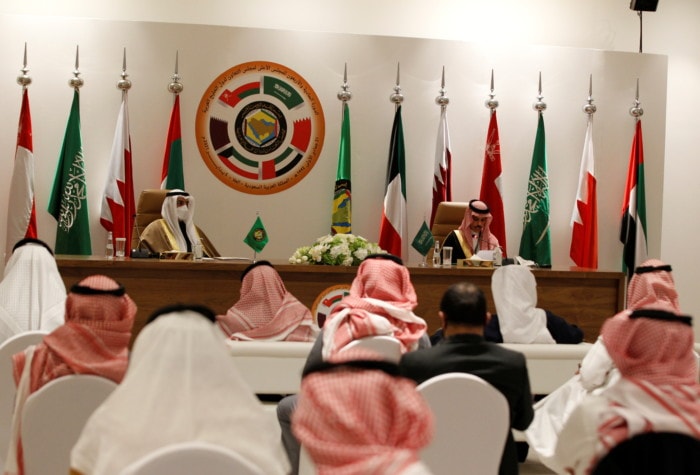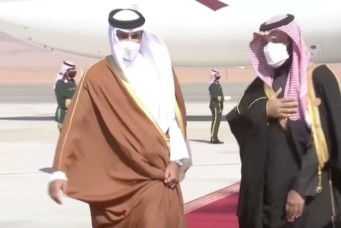A Timeline of Arab Rapprochement
A blockade of Qatar is lifted after Arabs mend fences and resume diplomatic ties.

On January 20, 2021, the Egyptian Foreign Ministry announced that it had agreed with Qatar to restore diplomatic relations after a severance of nearly three-and-a-half years. The reestablishing of ties came amid a flurry of regional diplomatic momentum welcoming Qatar back to the Arab fold.
Egypt, Saudi Arabia, the United Arab Emirates, and Bahrain had first cut off diplomatic ties with Qatar and banned its national carrier planes and ships from using their territories as part of an economic blockade on June 5, 2017. With the exception of Egypt, these four countries also kicked out Qatari civilians from their territories and recalled all of their civilians from Qatar.
But how did a major economic power such as Qatar end up so angering its allies and friends?
For years, tensions between Qatar and its Gulf neighbors had peaked and subsided as they accused Doha of funding terrorist groups such as ISIS and the Muslim Brotherhood. Qatar was also accused of attempting to undermine the sovereignty of other Gulf states through the use of its media apparatus, namely Al Jazeera, by waging a disinformation war with the goal of destabilizing the region to the benefit of Iran and Turkey. Qatar denied funding ISIS but admitted supporting the Muslim Brotherhood.
Qatari Emir Tammim Bin Hamad alluded to his promise to combat terrorism in conjunction with the Gulf Cooperation Council (GCC) resolutions and the U.S. military during the Arab American Islamic Summit that took place in Riyadh in May 2017. However, this was not enough; when efforts to persuade Qatar to end its support of the Muslim Brotherhood and curb media attacks on other countries failed, Saudi Arabia and its allies slapped a blockade on Doha. In a show of support for Riyadh’s action, Mauritania, the Eastern government of Libya, and Jordan also joined in the blockade against Qatar. Iran, which had always maintained friendly and stable ties with Qatar, claimed that the blockade was the consequence of then U.S. President Donald Trump’s constant attacks against the Islamic Republic.
Qatar vowed that it would not accept the “discriminatory” blockade and would maintain its sovereignty and economic accessibility.
June 5, 2017 – Egypt, UAE, and Saudi Arabia cut off diplomatic relations with Qatar in addition to enforcing a blockade on Qatari planes from flying in their airspace and Qatari ships from docking at their ports. These countries cite Qatar’s funding of terrorist organizations such as ISIS and the Muslim Brotherhood and their close relations with Iran and Turkey as the primary reason behind the blockade. Libya, Yemen, Bahrain, and the Maldives also join in the blockade. All nations in the Gulf Cooperation Council except Oman and Kuwait join in the blockade a few days later.
June 22, 2017 – Qatar is given a list of thirteen demands that it has to follow in order for the blockade to end. Kuwait acts as a mediator, but Qatar refuses to negotiate, claiming that it will not be held hostage by such demands in the middle of a blockade; it assures the international community that it will survive these conditions.
The thirteen demands are as follows:
- End diplomatic ties with Iran and expel members of the revolutionary guard from Qatar’s territory, in addition to adhering to U.S.-based sanctions when trading with Iran.
- Declare Al Qaeda, the Muslim Brotherhood and Hezbollah terrorist groups and sever all ties with them.
- Shut down the news station Al Jazeera for its role in normalizing and defending terrorist behavior.
- Shut down all news outlets funded by the Qatari government including networks that receive indirect funding.
- End all military ties with Turkey.
- Stop allocating funds to organizations deemed as terroristic by Egypt, the UAE, Saudi Arabia, or the United States.
- Extradite and freeze the bank accounts of wanted terrorists and criminals who have been deemed to have committed crimes against Egypt, the UAE, and Saudi Arabia.
- Abolish Qatari citizenship of wanted individuals from blockade countries who escape to Qatar.
- Stop assisting domestic opposition groups in blockade countries and hand over records of all prior contacts.
- Pay reparations to blockade countries for damage caused by prior activity.
- Qatar should increase its cohesion with other gulf countries when it comes to military, political and social matters.
- Respond to demands in no more than ten days after submission.
- Audits will be conducted by blockade countries after agreement to ensure Qatar is upholding its terms. Audits will be conducted monthly for the first year, and annually for the next nine years.
July 11, 2017 – US Secretary of State Rex Tillerson meets with Qatari Foreign Minister Sheikh Mohammed Bin Abdelrahman bin Jassim Al Thani in Doha. This leads to the signing of a memorandum of agreement that Qatar will commit to “tracking down and disabling terror financing”. This document is presented by Tillerson the following day to the foreign ministers of each of the four countries blockading Yemen, during a meeting in Jeddah, in hopes that this would help all parties reach a solution. The blockading states, however, refuse, claiming that this is not enough and that Qatar needs to do more.
July 18, 2017 – After Qatar’s refusal to adhere to their strict demands, the blockade nations choose instead to impose a more lenient set of principles for the Qatari government to follow. These principles include:
- Commitment by Qatar to actively oppose all terroristic activity and stop financing it.
- Commitment by Qatar to punish individuals who actively engage in rhetoric that is meant to incite violence and promote extremism.
- Commitment to the 2013 Riyadh agreement and the 2014 supplementary agreement in the GCC. The agreement states that countries which form part of the GCC should adhere to a set of rules including “no interference in the internal affairs of the [Gulf Cooperation] Council’s state,” “no support to deviant groups that oppose their states,” “no support for antagonistic media,” and “no support to the Muslim Brotherhood … [or other groups] that threaten the security and stability of the Council states”
- Adherence to all outcomes of the 2017 Arabic-Islamic-US summit held in Riyadh.
- Stop interference in affairs of sovereign nations and stop the support of all illegal organizations.
- Accept that it is paramount for all actors in the international community to oppose and battle terrorism.
August 8, 2017 – Qatar announces that it will allow citizens from 80 countries to enter Qatar without need for a visa. Depending on nationality, citizens from the list of 80 countries can spend between 30 and 180 days in Qatar without a visa. Qatar Airways Group Chief Executive Akbr al Baker claims that this would make Qatar the most open nation in the Gulf. “This is a momentous occasion for Qatar, making the number of nationalities eligible to enter our country without a visa the highest in the region, which is something that we are very proud of.”
September 7, 2017 – Trump offers to act as a mediator between the blockade states and Qatar and later recants previous support for the blockade, urging the Saudis to find an agreement quickly. During a news conference with Kuwaiti Emir Sheikh Sabah al-Ahmad al-jaber al-Sabah in Washington, Trump says that he will find a deal “very quickly” between Qatar and the blockade states. Doha says shortly afterwards that a call took place between President Trump and Emir Tammim bin Hammad Al-Thani to discuss his possible involvement in future mediation efforts.
June 11, 2018 – Qatar goes to the International Court of Justice to file a lawsuit against the United Arab Emirates, claiming it has violated the International Convention on the Elimination of All Forms of Racial Discrimination (CERD), an agreement that both Qatar and the UAE had ratified. Qatar claims that the UAE has breached the convention by participating in the blockade targeting Qatari civilians based on their “national origin”. The UAE, however, says that Qatar’s interpretation of this article is incorrect. Qatar also files a complaint with the World Trade organization, claiming that the security exception in the General Agreement on Trade and Tariffs (GATT) should not apply to it. Egypt, Saudi Arabia and Bahrain are not members of CERD, so Qatar could not defer to the International Court of Justice against them on that specific matter.
April 30, 2019 – The foreign ministry in Abu Dhabi says a boat carrying two Qatari military personnel was seized when it crossed into UAE territorial waters. The boat is released a week later.
July 9, 2019 – President Trump meets with Emir Tammim Bin Hammad al-Thani in the White House to discuss a variety of issues ranging from Qatari investments in the U.S. economy to Qatar’s geopolitical status.

Emir Tammim discusses plans to double the economic relationship between the United States and Qatar, which is worth around $185 billion at the time. During the meeting, a government official from Qatar signs contracts with five major US corporations that specialize in automation and weapon manufacturing: Boeing, General Electric, Raytheon, Gulfstream and Chevron.
Jassim al- Thani, an attaché for the Qatari embassy in the United States, says that Emir Tammim is willing to offer his mediating services if both Iran and the United States agree to sit at the negotiating table.
October 26, 2020 – The CEO of the Development Bank of Qatar claims that the blockade failed to impede Qatar’s economic growth.
January 5, 2021 – In a GCC summit, Qatar holds talks with the host, Saudi Arabia, and agrees to mend relationships. Saudi Arabia agrees to end the blockade and Qatar agrees to drop all international suits it has brought forth against blockade countries in the International Court of Justice over discrimination.
January 11, 2021 – Bahrain follows Saudi Arabia and the UAE and announces it is reopening its airspace to Qatari airlines. Egypt makes a similar announcement a day later.
January 18, 2021 – Qatar Airways resumes flights to Cairo International Airport with its flagship Boeing 787 Dreamliner. EgyptAir also resumes daily flights to Doha and announces it may increase frequency to two a day if there is sufficient demand.
January 20, 2021 – Egypt and Qatar exchange two notes agreeing to reestablish diplomatic ties.



